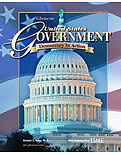
U. S. Government: Democracy In ActionChapter 22: Foreign Policy and DefenseChapter OverviewsIncreasingly, governments make choices about how their citizens will be affected by interaction with other nations. Chapter 22 focuses on how American foreign policy is established. Section 1 outlines the development of foreign policy. Once an isolationist nation, the United States today confronts global challenges: persecution of political dissenters in several nations, increased economic and trade competition, and the spread of international terrorism. However, the principal goal of American foreign policy is, as it always has been, to preserve the national security of the United States. Section 2 describes how the executive and legislative branches share foreign policy powers. Congress has the power to declare war and to control government spending. Nevertheless, the president has advantages over Congress in conducting foreign affairs—speaking for the nation in its dealings with other governments, controlling the agencies that carry out day-to-day foreign policy, and being able to take quick decisive action while maintaining secrecy. Section 3 deals with the responsibilities of the State and Defense departments. The primary objective of the Department of State is to promote the long-range security and well-being of the United States. The primary function of the Department of Defense is the defense of the nation. Section 4 explores American foreign policy in action. To settle conflicts peacefully, the United States government uses diplomatic tools such as alliances, foreign aid, and economic sanctions. When diplomacy fails, military action is sometimes necessary. |  |















